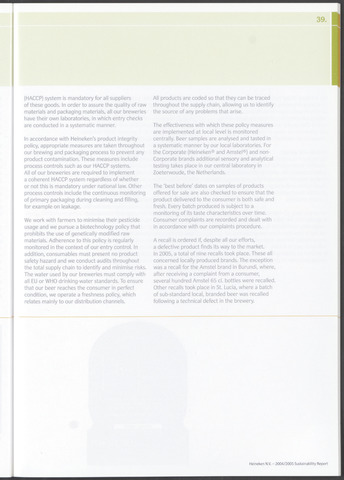39.
(HACCP) system is mandatory for all suppliers
of these goods. In order to assure the quality of raw
materials and packaging materials, all our breweries
have their own laboratories, in which entry checks
are conducted in a systematic manner.
In accordance with Heineken's product integrity
policy, appropriate measures are taken throughout
our brewing and packaging process to prevent any
product contamination. These measures include
process controls such as our HACCP systems.
All of our breweries are required to implement
a coherent HACCP system regardless of whether
or not this is mandatory under national law. Other
process controls include the continuous monitoring
of primary packaging during cleaning and filling,
for example on leakage.
We work with farmers to minimise their pesticide
usage and we pursue a biotechnology policy that
prohibits the use of genetically modified raw
materials. Adherence to this policy is regularly
monitored in the context of our entry control. In
addition, consumables must present no product
safety hazard and we conduct audits throughout
the total supply chain to identify and minimise risks.
The water used by our breweries must comply with
all EU or WHO drinking-water standards. To ensure
that our beer reaches the consumer in perfect
condition, we operate a freshness policy, which
relates mainly to our distribution channels.
All products are coded so that they can be traced
throughout the supply chain, allowing us to identify
the source of any problems that arise.
The effectiveness with which these policy measures
are implemented at local level is monitored
centrally. Beer samples are analysed and tasted in
a systematic manner by our local laboratories. For
the Corporate (Heineken® and Amstel®) and non-
Corporate brands additional sensory and analytical
testing takes place in our central laboratory in
Zoeterwoude, the Netherlands.
The 'best before' dates on samples of products
offered for sale are also checked to ensure that the
product delivered to the consumer is both safe and
fresh. Every batch produced is subject to a
monitoring of its taste characteristics over time.
Consumer complaints are recorded and dealt with
in accordance with our complaints procedure.
A recall is ordered if, despite all our efforts,
a defective product finds its way to the market.
In 2005, a total of nine recalls took place. These all
concerned locally produced brands. The exception
was a recall for the Amstel brand in Burundi, where,
after receiving a complaint from a consumer,
several hundred Amstel 65 cl. bottles were recalled.
Other recalls took place in St. Lucia, where a batch
of sub-standard local, branded beer was recalled
following a technical defect in the brewery.
Heineken N.V. - 2004/2005 Sustainability Report

